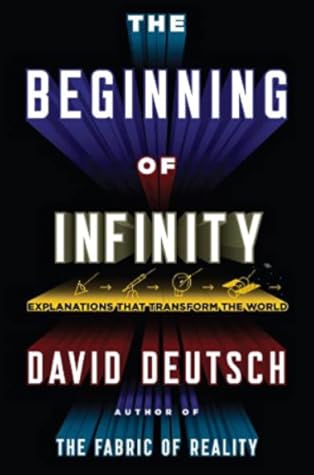More on this book
Community
Kindle Notes & Highlights
Read between
December 6, 2022 - April 16, 2023
In this book I argue that all progress, both theoretical and practical, has resulted from a single human activity: the quest for what I call good explanations.
As the ancient philosopher Heraclitus remarked, ‘No man ever steps in the same river twice, for it is not the same river and he is not the same man.’
Discovering a new explanation is inherently an act of creativity.
Thus ‘how do we know…?’ is transformed into ‘by what authority do we claim…?’
the recognition that there are no authoritative sources of knowledge, nor any reliable means of justifying ideas as being true or probable – is called fallibilism.
So it is fallibilism, not mere rejection of authority, that is essential for the initiation of unlimited knowledge growth – the beginning of infinity.
one thing that all conceptions of the Enlightenment agree on is that it was a rebellion, and specifically a rebellion against authority in regard to knowledge.
Testability is now generally accepted as the defining characteristic of the scientific method. Popper called it the ‘criterion of demarcation’ between science and non-science.
The difference between humans and other species is in what kind of knowledge they can use (explanatory instead of rule-of-thumb) and in how they create it (conjecture and criticism of ideas, rather than the variation and selection of genes). It is precisely those two differences that explain why every other organism can function only in a certain range of environments that are hospitable to it, while humans transform inhospitable environments like the biosphere into support systems for themselves.
That progress is both possible and desirable is perhaps the quintessential idea of the Enlightenment. It motivates all traditions of criticism, as well as the principle of seeking good explanations.
not only is the universe full of evidence, it is full of the same evidence everywhere. All people in the universe, once they have understood enough to free themselves from parochial obstacles, face essentially the same opportunities. This is an underlying unity in the physical world more significant than all the dissimilarities I have described between our environment and a typical one: the fundamental laws of nature are so uniform, and evidence about them so ubiquitous, and the connections between understanding and control so intimate, that, whether we are on our parochial home planet or a
...more
Human brains and DNA molecules each have many functions, but among other things they are general-purpose information-storage media: they are in principle capable of storing any kind of information.
Organisms are the slaves, or tools, that genes use to achieve their ‘purpose’ of spreading themselves through the population.
what genes are adapted to – what they do better than almost any variant of themselves – has nothing to do with the species or the individuals or even their own survival in the long run. It is getting themselves replicated more than rival genes.
Dawkins coined the term memes (rhymes with ‘dreams’) for ideas that are replicators.
the knowledge embodied in genes is knowledge of how to get themselves replicated at the expense of their rivals.
(Binary numbers were already well known. The mathematician and philosopher Gottfried Wilhelm Leibniz had even suggested using them for mechanical calculation in the seventeenth century.)
Error-correction is the beginning of infinity.
beginning of infinity can be described either as a condition where ‘progress in the future will be unbounded’ or as the condition where ‘an infinite amount of progress will be made’.
the laws of physics determine the distinction not only between rare and common, probable and improbable, fine-tuned or not, but even between finite and infinite.
Einstein’s theory of curved space and time, which contradicted Euclid’s, was vindicated by experiments that were more accurate than Gauss’s. In the space near the Earth, the angles of a large triangle can add up to as much as 180.0000002 degrees, a variation from Euclid’s geometry which, for instance, satellite navigation systems nowadays have to take into account.
Gödel had discovered using a different approach to Hilbert’s challenge – almost all mathematical truths have no proofs. They are unprovable truths.
During the first few centuries of the Enlightenment, there has been a constant feeling that rapid and accelerating innovation is getting out of hand. But our capacity to cope with, and enjoy, changes in our technology, lifestyle, ethical norms and so on has been increasing too, with the weakening and extinction of some of the anti-rational memes that used to sabotage it. In future, when the rate of innovation will also increase due to the sheer increasing clock rate and throughput of brain add-ons and AI computers, then our capacity to cope with that will increase at the same rate or faster:
...more


